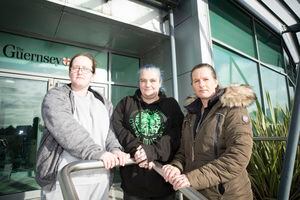Stop-start therapy failing our children, say mothers
REGULAR changes in therapy staff are not fair on the children who need their support, a group of mothers has said.

Three women spoke to the Guernsey Press about how their children with medical and learning disabilities have had to rely heavily on school support because there are not enough children’s physiotherapists and occupational therapists on the island.
Julie Lunk said recently that she was left in a state of despair about the lack of help for her autistic son and said the island’s broken system of occupational therapy was failing many vulnerable children.
She was joined by Clare Garnham and Audrey Devlin, who both have sons with additional needs they do not feel are being met by qualified professionals.
Miss Garnham’s eldest son is now 21 but was diagnosed with ADHD in secondary school.
‘We tried to get doctors and school nurses to help because his concentration and behaviour was a nightmare but I was told that it was my fault, my bad parenting. I was being too soft on him and his behaviour was due to our family splitting up,’ she said.
The situation came to a head in his GCSE year when a friend found him on the edge of a cliff and he was taken to hospital and visited by a mental health worker.
‘One person was amazing with him, but others just wanted to pump him with drugs. Medication is not the answer for every child.
‘The first set of meds he was on made him like a walking zombie, then they changed them and he was sleeping for 16 or 17 hours at a time so as a family we stopped the medication and tried to help him at home.’
Miss Garnham said that, while he is a lot better now, he still struggles with mental health and believes earlier intervention by a professional that would listen would have got him through his GCSEs.
They are still waiting for a meeting at the Oberlands to sign off for a test to determine whether he has a hereditary disorder.
It was only on an at-home visit when the visiting mental health worker saw her other son and asked if he had been assessed.
‘We had been trying to get my other son an appointment and got in touch with occupational health but they just sent us a leaflet of some physical exercises to do,’ she said.
‘The four months we spent in Southampton when he was being treated for cancer was the most beneficial – they addressed all kinds of things with his mental and physical health and even spotted his dyslexia which everyone over here had missed.’
Audrey Devlin’s son was diagnosed with cerebral palsy at age two but had no therapy of any kind until he started primary school where staff pushed for him to see a physiotherapist.
‘The school has employed someone to work with him one-on-one for a couple of hours a day but we have had so many other occupational therapists and physios since he started school.
‘It means they change their routines and equipment and exercises and it’s not fair on the child, each time there’s a new one it means starting all over again.’
She said on one physiotherapist’s second visit she was told she was starving her son.
‘Luckily we had the backing of the school and confirmation that he can lose weight because of his condition, but I was so scared social services were going to take my children away from me – it almost broke my marriage.’
He now wakes up five or six times in a night with nightmares, but efforts to be seen by a professional have been futile.
‘The States need to bring professionals over and do enough to make them stay – one told us she wanted to stay but couldn’t get her contract renewed.’
Both mothers said the help of their sons’ schools has made it possible for them to continue their education. Visiting therapists and physios were a great asset when they were available but change very often.
Miss Garnham said: ‘It’s not fair on the children, they have to go over the same things again and again with new therapists and, just as they get settled into a routine, it all changes for them again.
They were concerned that with the new school changes more children like theirs would slip through the system unrecognised and without the help they need.
Ms Lunk said it was disgusting how much schools had to do on their own because of the failings of the professional recruitment.
Read the statement from the committee for Health & Social Care here.





